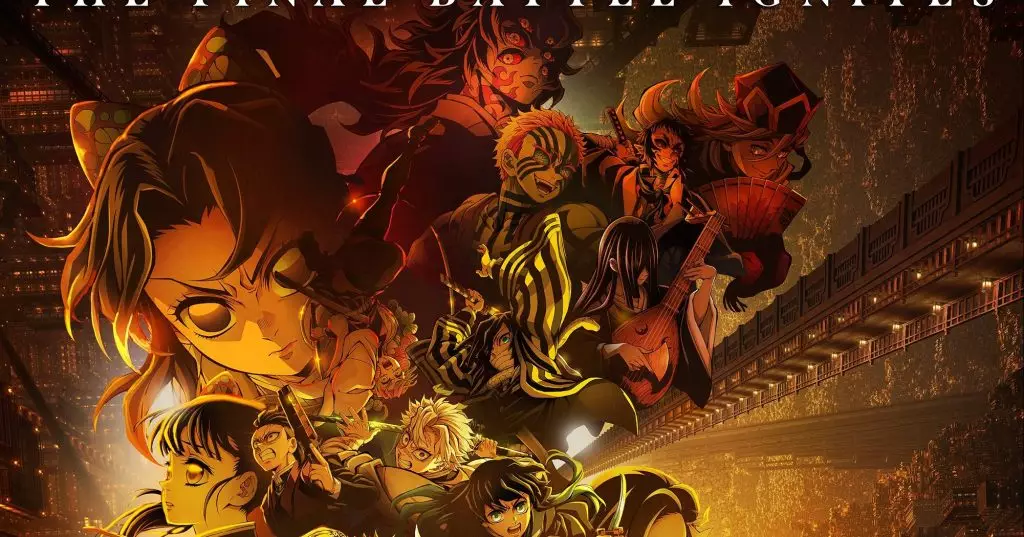In recent years, Demon Slayer has transcended the realm of merely popular anime to become a formidable cultural and commercial juggernaut, especially within Japan. Its latest film, “Infinity Castle,” has shattered records and captured the imaginations of millions nationwide, yet this success warrants a deeper reflection. While record-breaking box office figures are often celebrated as indicators of cultural vitality, they also expose the increasing commodification and homogenization of popular media. The film’s remarkable debut—selling over 3.8 million tickets in just three days and grossing nearly $49.6 million—is not only a testament to its storytelling appeal but also a reflection of the industry’s relentless pursuit of franchise-driven revenue. The movie’s unprecedented performance in Imax theaters and its dominance over previous domestic hits illustrate a market that increasingly values spectacle and franchise loyalty over originality. As we applaud the commercial milestones, we should also question whether this signifies genuine cultural growth or an addictive cycle of consumption fueled by corporate influence.
Commercialism and Cultural Impact: A Double-Edged Sword
Demon Slayer’s explosion into the international scene, propelled by global acquisition and distribution plans from the likes of Sony and Crunchyroll, underscores the strategic importance of anime as a global cultural export. However, this expansion comes with a caveat: the risk of turning art into a predictable commodity. The film’s record-breaking performance, particularly in the Imax format, reveals a market that is increasingly drawn to visual grandeur and franchise continuity, rather than independent artistic expression. The narrative of Tanjiro Kamado’s fight against demonic forces is formulaic—a hero’s journey embedded in familiar themes—yet it is packaged in such a way as to maximize profitability.
This approach constantly raises questions about artistic integrity. Does the allure of record-breaking numbers diminish the potential for innovation? When studios prioritize sequels and franchise installments, they might be sacrificing originality for safety and guaranteed profits. Moreover, the massive investment in visual effects, international marketing, and cross-media tie-ins might detract from the storytelling itself. The film’s impressive sales figures could mask a cultural landscape increasingly driven by consumerist instincts rather than artistic exploration.
Franchise Fatigue and the Future of Anime
The success of “Infinity Castle” signals a broader trend—anime becoming a mainstream, lucrative enterprise. Its record-breaking debut outstripping previous hits like “Mugen Train” signifies both a peak of current enthusiasm and a potential danger: franchise fatigue. When every film release is anticipated as an event that smashes records, it creates a skewed perception of cultural health.
While critics can celebrate the technical achievements and the fan engagement, it must be acknowledged that such phenomena often depend on established brands rather than organic artistic innovation. The risk, in the long term, is stagnation. With the franchise increasingly driven by international markets, critical voices in Japan have expressed concern about the cultural dilution of anime as an art form rooted in Japanese traditions. The emphasis on high-stakes spectacle and international appeal might erode the unique storytelling identity that once distinguished anime from Western animation and live-action.
This focus on high returns could lead to a homogenized market where creativity is secondary to profit. The industry has shown an alarming tendency to prioritize safety and predictable success over taking risks that could innovate or challenge audiences. The current momentum suggests that anime’s appeal—though vast—is increasingly susceptible to the same formulaic cycles that plague Hollywood. This commodification risks reducing once-innovative storytelling to formulaic templates, threatening the cultural vibrancy that propelled the genre’s global rise.
The Political and Cultural Implications of Franchise Domination
From a center-right perspective, the trend exemplified by Demon Slayer’s record-breaking performance reflects broader societal shifts—striking a balance between market-driven success and cultural sovereignty. The global push for anime, including this latest film, underscores how entertainment is increasingly intertwined with international corporate interests. While economic growth and innovation are vital, they should not come at the expense of cultural authenticity and diversity.
The heavy commercialization of Demon Slayer could be viewed as nostalgic escapism—an industry catering to mass appeal rather than meaningful cultural expression. It also raises questions about the influence of global conglomerates in shaping what Japanese culture vis-a-vis anime truly signifies. While the international success of the franchise opens doors for cultural exchange, it risks turning art into a tool for corporate profit, diluting Japan’s unique artistic heritage.
Furthermore, the emphasis on blockbuster hits and record-breaking numbers may contribute to a cultural landscape where the value of artistic risk is diminished. Instead of promoting innovative storytelling, studios might prefer safe bets that guarantee a profitable return. Such a trend undermines the potential for local cultural voices to flourish independently, emphasizing the need for a more balanced approach that protects artistic integrity while embracing commercial viability.
The rise of such mega-franchises invites us to reflect on how national cultures can preserve authenticity in an increasingly globalized entertainment market. Commercial success should not replace cultural substance; instead, it ought to serve as a platform for nurturing genuine artistic expression. Only then can anime—and any cultural product—continue its evolution without sacrificing its soul to the insatiable appetites of corporate capitalism.

